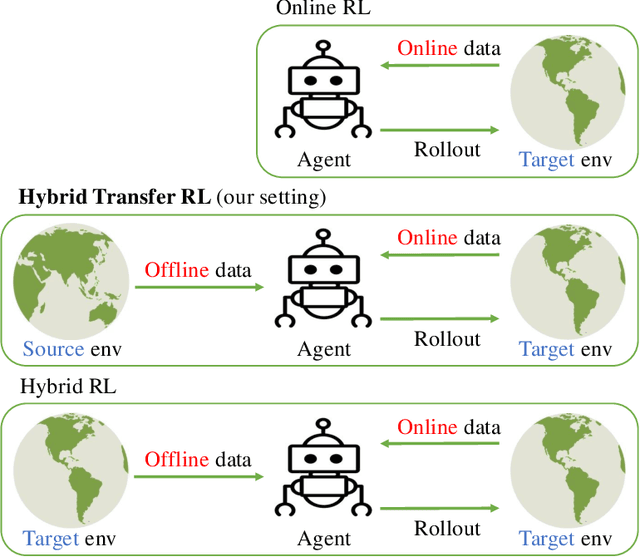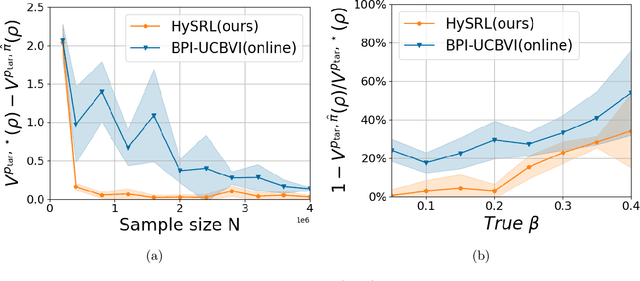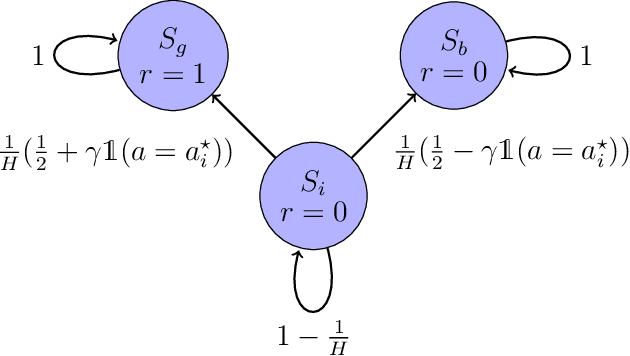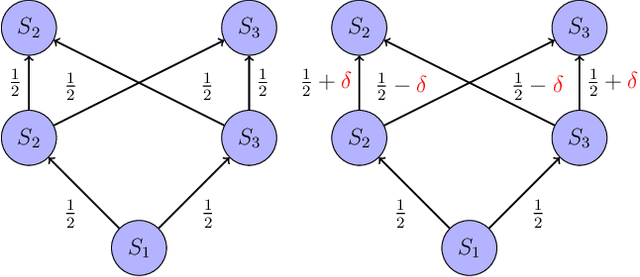Laixi Shi
Understanding Agent Scaling in LLM-Based Multi-Agent Systems via Diversity
Feb 03, 2026Abstract:LLM-based multi-agent systems (MAS) have emerged as a promising approach to tackle complex tasks that are difficult for individual LLMs. A natural strategy is to scale performance by increasing the number of agents; however, we find that such scaling exhibits strong diminishing returns in homogeneous settings, while introducing heterogeneity (e.g., different models, prompts, or tools) continues to yield substantial gains. This raises a fundamental question: what limits scaling, and why does diversity help? We present an information-theoretic framework showing that MAS performance is bounded by the intrinsic task uncertainty, not by agent count. We derive architecture-agnostic bounds demonstrating that improvements depend on how many effective channels the system accesses. Homogeneous agents saturate early because their outputs are strongly correlated, whereas heterogeneous agents contribute complementary evidence. We further introduce $K^*$, an effective channel count that quantifies the number of effective channels without ground-truth labels. Empirically, we show that heterogeneous configurations consistently outperform homogeneous scaling: 2 diverse agents can match or exceed the performance of 16 homogeneous agents. Our results provide principled guidelines for building efficient and robust MAS through diversity-aware design. Code and Dataset are available at the link: https://github.com/SafeRL-Lab/Agent-Scaling.
MoDoMoDo: Multi-Domain Data Mixtures for Multimodal LLM Reinforcement Learning
May 30, 2025



Abstract:Reinforcement Learning with Verifiable Rewards (RLVR) has recently emerged as a powerful paradigm for post-training large language models (LLMs), achieving state-of-the-art performance on tasks with structured, verifiable answers. Applying RLVR to Multimodal LLMs (MLLMs) presents significant opportunities but is complicated by the broader, heterogeneous nature of vision-language tasks that demand nuanced visual, logical, and spatial capabilities. As such, training MLLMs using RLVR on multiple datasets could be beneficial but creates challenges with conflicting objectives from interaction among diverse datasets, highlighting the need for optimal dataset mixture strategies to improve generalization and reasoning. We introduce a systematic post-training framework for Multimodal LLM RLVR, featuring a rigorous data mixture problem formulation and benchmark implementation. Specifically, (1) We developed a multimodal RLVR framework for multi-dataset post-training by curating a dataset that contains different verifiable vision-language problems and enabling multi-domain online RL learning with different verifiable rewards; (2) We proposed a data mixture strategy that learns to predict the RL fine-tuning outcome from the data mixture distribution, and consequently optimizes the best mixture. Comprehensive experiments showcase that multi-domain RLVR training, when combined with mixture prediction strategies, can significantly boost MLLM general reasoning capacities. Our best mixture improves the post-trained model's accuracy on out-of-distribution benchmarks by an average of 5.24% compared to the same model post-trained with uniform data mixture, and by a total of 20.74% compared to the pre-finetuning baseline.
KL-regularization Itself is Differentially Private in Bandits and RLHF
May 23, 2025Abstract:Differential Privacy (DP) provides a rigorous framework for privacy, ensuring the outputs of data-driven algorithms remain statistically indistinguishable across datasets that differ in a single entry. While guaranteeing DP generally requires explicitly injecting noise either to the algorithm itself or to its outputs, the intrinsic randomness of existing algorithms presents an opportunity to achieve DP ``for free''. In this work, we explore the role of regularization in achieving DP across three different decision-making problems: multi-armed bandits, linear contextual bandits, and reinforcement learning from human feedback (RLHF), in offline data settings. We show that adding KL-regularization to the learning objective (a common approach in optimization algorithms) makes the action sampled from the resulting stochastic policy itself differentially private. This offers a new route to privacy guarantees without additional noise injection, while also preserving the inherent advantage of regularization in enhancing performance.
Robust Gymnasium: A Unified Modular Benchmark for Robust Reinforcement Learning
Feb 27, 2025



Abstract:Driven by inherent uncertainty and the sim-to-real gap, robust reinforcement learning (RL) seeks to improve resilience against the complexity and variability in agent-environment sequential interactions. Despite the existence of a large number of RL benchmarks, there is a lack of standardized benchmarks for robust RL. Current robust RL policies often focus on a specific type of uncertainty and are evaluated in distinct, one-off environments. In this work, we introduce Robust-Gymnasium, a unified modular benchmark designed for robust RL that supports a wide variety of disruptions across all key RL components-agents' observed state and reward, agents' actions, and the environment. Offering over sixty diverse task environments spanning control and robotics, safe RL, and multi-agent RL, it provides an open-source and user-friendly tool for the community to assess current methods and foster the development of robust RL algorithms. In addition, we benchmark existing standard and robust RL algorithms within this framework, uncovering significant deficiencies in each and offering new insights.
Hybrid Transfer Reinforcement Learning: Provable Sample Efficiency from Shifted-Dynamics Data
Nov 06, 2024



Abstract:Online Reinforcement learning (RL) typically requires high-stakes online interaction data to learn a policy for a target task. This prompts interest in leveraging historical data to improve sample efficiency. The historical data may come from outdated or related source environments with different dynamics. It remains unclear how to effectively use such data in the target task to provably enhance learning and sample efficiency. To address this, we propose a hybrid transfer RL (HTRL) setting, where an agent learns in a target environment while accessing offline data from a source environment with shifted dynamics. We show that -- without information on the dynamics shift -- general shifted-dynamics data, even with subtle shifts, does not reduce sample complexity in the target environment. However, with prior information on the degree of the dynamics shift, we design HySRL, a transfer algorithm that achieves problem-dependent sample complexity and outperforms pure online RL. Finally, our experimental results demonstrate that HySRL surpasses state-of-the-art online RL baseline.
Can We Break the Curse of Multiagency in Robust Multi-Agent Reinforcement Learning?
Sep 30, 2024
Abstract:Standard multi-agent reinforcement learning (MARL) algorithms are vulnerable to sim-to-real gaps. To address this, distributionally robust Markov games (RMGs) have been proposed to enhance robustness in MARL by optimizing the worst-case performance when game dynamics shift within a prescribed uncertainty set. Solving RMGs remains under-explored, from problem formulation to the development of sample-efficient algorithms. A notorious yet open challenge is if RMGs can escape the curse of multiagency, where the sample complexity scales exponentially with the number of agents. In this work, we propose a natural class of RMGs where the uncertainty set of each agent is shaped by both the environment and other agents' strategies in a best-response manner. We first establish the well-posedness of these RMGs by proving the existence of game-theoretic solutions such as robust Nash equilibria and coarse correlated equilibria (CCE). Assuming access to a generative model, we then introduce a sample-efficient algorithm for learning the CCE whose sample complexity scales polynomially with all relevant parameters. To the best of our knowledge, this is the first algorithm to break the curse of multiagency for RMGs.
BECAUSE: Bilinear Causal Representation for Generalizable Offline Model-based Reinforcement Learning
Jul 15, 2024



Abstract:Offline model-based reinforcement learning (MBRL) enhances data efficiency by utilizing pre-collected datasets to learn models and policies, especially in scenarios where exploration is costly or infeasible. Nevertheless, its performance often suffers from the objective mismatch between model and policy learning, resulting in inferior performance despite accurate model predictions. This paper first identifies the primary source of this mismatch comes from the underlying confounders present in offline data for MBRL. Subsequently, we introduce \textbf{B}ilin\textbf{E}ar \textbf{CAUS}al r\textbf{E}presentation~(BECAUSE), an algorithm to capture causal representation for both states and actions to reduce the influence of the distribution shift, thus mitigating the objective mismatch problem. Comprehensive evaluations on 18 tasks that vary in data quality and environment context demonstrate the superior performance of BECAUSE over existing offline RL algorithms. We show the generalizability and robustness of BECAUSE under fewer samples or larger numbers of confounders. Additionally, we offer theoretical analysis of BECAUSE to prove its error bound and sample efficiency when integrating causal representation into offline MBRL.
Distributionally Robust Constrained Reinforcement Learning under Strong Duality
Jun 22, 2024


Abstract:We study the problem of Distributionally Robust Constrained RL (DRC-RL), where the goal is to maximize the expected reward subject to environmental distribution shifts and constraints. This setting captures situations where training and testing environments differ, and policies must satisfy constraints motivated by safety or limited budgets. Despite significant progress toward algorithm design for the separate problems of distributionally robust RL and constrained RL, there do not yet exist algorithms with end-to-end convergence guarantees for DRC-RL. We develop an algorithmic framework based on strong duality that enables the first efficient and provable solution in a class of environmental uncertainties. Further, our framework exposes an inherent structure of DRC-RL that arises from the combination of distributional robustness and constraints, which prevents a popular class of iterative methods from tractably solving DRC-RL, despite such frameworks being applicable for each of distributionally robust RL and constrained RL individually. Finally, we conduct experiments on a car racing benchmark to evaluate the effectiveness of the proposed algorithm.
Tractable Equilibrium Computation in Markov Games through Risk Aversion
Jun 20, 2024Abstract:A significant roadblock to the development of principled multi-agent reinforcement learning is the fact that desired solution concepts like Nash equilibria may be intractable to compute. To overcome this obstacle, we take inspiration from behavioral economics and show that -- by imbuing agents with important features of human decision-making like risk aversion and bounded rationality -- a class of risk-averse quantal response equilibria (RQE) become tractable to compute in all $n$-player matrix and finite-horizon Markov games. In particular, we show that they emerge as the endpoint of no-regret learning in suitably adjusted versions of the games. Crucially, the class of computationally tractable RQE is independent of the underlying game structure and only depends on agents' degree of risk-aversion and bounded rationality. To validate the richness of this class of solution concepts we show that it captures peoples' patterns of play in a number of 2-player matrix games previously studied in experimental economics. Furthermore, we give a first analysis of the sample complexity of computing these equilibria in finite-horizon Markov games when one has access to a generative model and validate our findings on a simple multi-agent reinforcement learning benchmark.
Enhancing Efficiency of Safe Reinforcement Learning via Sample Manipulation
May 31, 2024



Abstract:Safe reinforcement learning (RL) is crucial for deploying RL agents in real-world applications, as it aims to maximize long-term rewards while satisfying safety constraints. However, safe RL often suffers from sample inefficiency, requiring extensive interactions with the environment to learn a safe policy. We propose Efficient Safe Policy Optimization (ESPO), a novel approach that enhances the efficiency of safe RL through sample manipulation. ESPO employs an optimization framework with three modes: maximizing rewards, minimizing costs, and balancing the trade-off between the two. By dynamically adjusting the sampling process based on the observed conflict between reward and safety gradients, ESPO theoretically guarantees convergence, optimization stability, and improved sample complexity bounds. Experiments on the Safety-MuJoCo and Omnisafe benchmarks demonstrate that ESPO significantly outperforms existing primal-based and primal-dual-based baselines in terms of reward maximization and constraint satisfaction. Moreover, ESPO achieves substantial gains in sample efficiency, requiring 25--29% fewer samples than baselines, and reduces training time by 21--38%.
 Add to Chrome
Add to Chrome Add to Firefox
Add to Firefox Add to Edge
Add to Edge